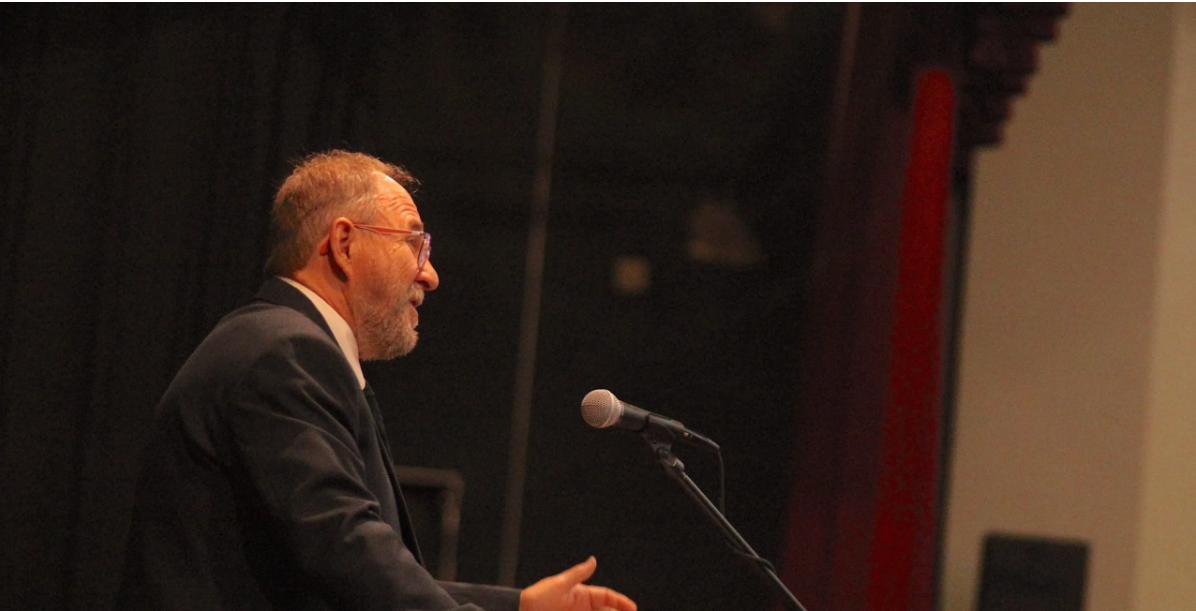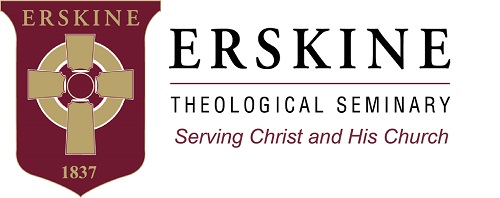Martha Margaret Cotten, left, celebrates with the graduates and their families. Graduates, their families, and…

Opening convocation of spring semester features ARP moderator
“Knowing who you are and whose you are changes your whole world,” Bill McKay told students, faculty, and staff during Erskine’s first convocation of the semester, in which he spoke about Christian identity and unity.
McKay (pictured above), who serves as moderator of the General Synod of the Associate Reformed Presbyterian Church, is a ruling elder at Grace Presbyterian Church in Woodstock, Ontario, Canada.
The moderator was introduced by Erskine President Dr. Steve Adamson. McKay began his address by adding to that introduction, revealing such aspects of himself and his experience as his age and nationality; his ancestry; his role as a husband, father, and grandfather; his career in the printing industry; and even his years as a hockey player.
“I’ve been told that the chapel focus for the spring semester this year is ‘Christian Unity,’” McKay said. “With this focus, I want to consider a particular concept of that unity to which we are called—the concept of a biblical identity.”
“A few minutes ago, I identified myself in 18 different ways,” the moderator said, and asked members of the audience to recall some of the elements of identity he had listed.
Drawing a distinction between use of the world’s standards and use of biblical standards in determining identity, he noted that “the world is fickle, and its standards are always in flux.”
McKay took as the main text for his talk 2 Corinthians 5:16-20, in which the Apostle Paul speaks about new identity in Christ and God’s call to Christians who possess this new identity to engage in the ministry of reconciliation.
He illustrated the inadequacy of worldly standards of identity by referring to a story in Mark 6:1-3. Jesus teaches in the synagogue in his hometown, but members of the community take offense at him, saying, “is this not the carpenter, the son of Mary?”—identifying him using only cultural norms.
“They fell back on the old stereotypes of who they thought he was,” McKay said. “Cultural norms give us an incomplete picture of who Jesus is. Our misconceptions, arrogance, pride, and prejudice blind us. All too often, our cultural stereotypes cause us to mistakenly evaluate people.”
Identifying themselves by the world’s standards is insufficient for Christians. The moderator stressed that Christians “are to be identified using a biblically based cultural distinctive.” This is essential because “Our identity in Christ is part of accepting his gift of eternal life through faith.”
Asserting the centrality of faith in the Christian life, which is a life of faith “from beginning to end,” McKay described the connection of faith to both Christian identity and Christian unity.
“Faith is a tool of unity that is being used to unite us with God in Jesus Christ, as we are connected with each other through our faith in Christ,” he said. “Faith is a reality that shapes how we live in union with Christ and ultimately with God and with each other.”
Christians are sustained by their faith in Jesus Christ and come together through their faith in Christ.
“When we have a true love for God in our heart and a willingness to serve him, then and only then will we be seen for how we must be identified,” the moderator said.
“As Christians, we are called to be identified as being different from the world around us,” he said, listing the fruits of the Holy Spirit.
“We are to be identified by love, joy, peace, forbearance, kindness, goodness, faithfulness, gentleness, and self-control,” McKay said. “This is the identity that we are to show to the world.”
The Chapel Worship Team led the music for the service of worship, which was offered in Lesesne Auditorium on the Erskine campus, and Chaplain Josh Chiles opened the service in prayer.

